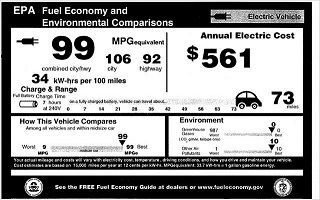The EPA’s MPG Ratings for Electric Vehicles – Essentially Meaningless
As my colleague Jon Lesage notes in his newsletter, the U.S. Environmental Protection Agency (EPA) may be changing the way it does its MPG (miles per gallon) calculations. Recent news has shown large gaps between claims and truth in the ratings for conventional cars and hybrids, and the car-buying public is rightfully demanding a change. But the way this works for electric vehicles is an even better candidate for revamping.
Since the 1970s, the EPA has provided ratings for all cars sold in the U.S. in terms of estimated miles per gallon, but concern for the use of gasoline had been part of our culture for quite some time. In fact, it was mentioned in “Catcher in the Rye” (1951), but it came rushing to the fore of our consciousness during the first oil embargo in 1973.
Fast-forward 40 years to the day in which electric vehicles are gaining ground, and note that the EPA puts MPGe (miles per gallon equivalent) ratings on EVs – even though they don’t use gasoline at all. This rating means: how far the car goes on 33.7 kilowatt-hours (the amount of chemical in one gallon of gasoline).
Maybe I’m missing something, but this strikes me as wholly irrelevant. EV owners may want to know how much fossil fuel they’re displacing, but that’s not going to come from this figure; the displacement of oil, coal, and natural gas is largely a function of the way in which the power was generated to serve the incremental load represented by that car – and that, in turn, is a function of many things that change night after night, year after year.
This whole MPGe concept is even more meaningless in the case of plug-in hybrids, where some drivers can run their cars on 99% electricity, and others on 99% gasoline. In that case, it’s not only meaningless, it’s overtly misleading.
The answer? Scrap MPG ratings for electric vehicles.


Craig,
We agree here.
While some – obviously you, me, and most of your readers fall into this category – want to see the mpg rating for environmental reasons, the chief concern for most of the car-buying public was money. If a car gets 18 mpg, then it’s going to cost the average driver ~$200/month in fuel, while a car that gets 35 mpg would cost half as much… By posting the mileage on the window, that was a reminder to lower-end car buyers that they will have to pay for fill-ups as well as paying the sticker price.
For EV’s, this simply doesn’t matter as much. Expensive electric markets might have you paying as much as ~$0.13/kWh… So the difference between a Nissan Leaf (28 kWh/100 miles), and a Tesla S (38 kWh/100 miles) ends up having a cost difference of only ~$13/month in the most expensive markets.
Worrying about $13/month difference in maintenance when the vehicle costs $100,000 is just foolish. None of the prospective Tesla buyers would possibly care. It’s useless information for them.
What would be interesting, is if the dealerships were required to post the “gallons of tar sands oil equivalent” in emissions that are released by charging the battery for the vehicle. This would obviously change (dramatically) depending on region… and a figure would have to be offered both for slow overnight charging, and daytime fast-charging. That would be informative for many EV advocates, and useful information for many prospective EV buyers.
MPGe should not be scrapped, although I agree the implicit comparison with gasoline mileage is not very relevant. But I disagree with Glenn that the primary concern of an EV buyer is money. If you’re buying an EV, you’re likely to be less motivated by economics than environmentalism… otherwise you’d probably be buying a hybrid.
So you care about your carbon emissions, and so knowing your approximate miles per kWh is useful. A lot of EV buyers also try to charge exclusively with electricity generated by PV, so knowing something about the miles per kWh is useful for sizing your array.
While there is the problem that the ratings are not yet very accurate, it’s still useful to know that a Leaf is more efficient than a Tesla.
A couple more thoughts:
1) If you don’t measure it, you won’t improve it. No efficiency ratings for EVs would remove an incentive to make EVs more efficient.
2) miles per kWh also matters in terms of charging time. Even with a level 2 (220V) charger on a 30 A circuit, you can only charge at 6 kWh/hour. If you have limited charging time, that means a Tesla S (using Glen’s numbers) will only gain 15 miles of range in ah hour, while a Leaf will gain 21 miles of range in an hour. That makes a *big* difference if you have to run back-to-back errands on the same day. And given the expense of installing a level 2 charger, the better fuel efficiency could easily make the difference between being about to recharge overnight after your typical commute.
Suppose your commute is 65 miles round trip, and your garage currently has only a 15A, 110V socket (What I’d expect to see in a modern garage). 10 hours of recharging would give you 16.5 kWh, or 59 miles of range in a Leaf, or 43 miles of range in a Model S. So a Model S buyer with a 60 mile commute would have to install a level 2 charger at several thousand dollars, while a similar Leaf Buyer would not. How’s that for economic impact of fuel economy?